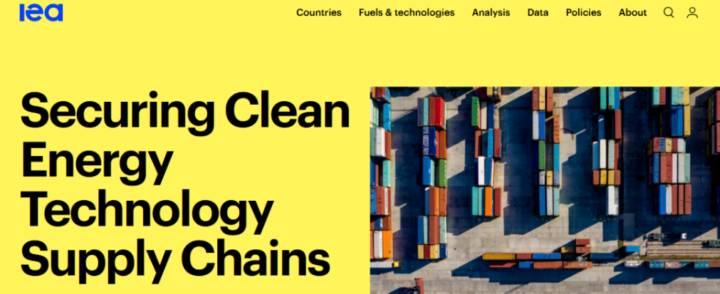Securing Clean Energy Technology Supply Chains
Secure, resilient and sustainable energy technology supply chains are central to successful clean energy transitions. The race to net zero emissions will redefine global energy security and shift the focus from the supply of fossil fuels to the supply of the minerals, materials and manufacturing capacity needed to deliver clean energy technologies. This report, Securing Clean Energy Technology Supply Chains, assesses current and future supply chain needs for key technologies – including solar PV, batteries for electric vehicles and low emissions hydrogen – and provides a framework for governments and industry to identify, assess and respond to emerging opportunities and vulnerabilities. The IEA highlights five key strategies to build secure, resilient and sustainable supply chains: Diversify, Accelerate, Innovate, Collaborate and Invest.
Solar PV Global Supply Chains
Solar PV is a crucial pillar of clean energy transitions worldwide, underpinning efforts to reach international energy and climate goals. Over the last decade, the amount of solar PV deployed around the world has increased massively while its costs have declined drastically. Putting the world on a path to reaching net zero emissions requires solar PV to expand globally on an even greater scale, raising concerns about security of manufacturing supply for achieving such rapid growth rates – but also offering new opportunities for diversification.
This special report examines solar PV supply chains from raw materials all the way to the finished product, spanning the five main segments of the manufacturing process: polysilicon, ingots, wafers, cells and modules. The analysis covers supply, demand, production, energy consumption, emissions, employment, production costs, investment, trade and financial performance, highlighting key vulnerabilities and risks at each stage. Because diversification is one of the key strategies for reducing supply chain risks, the report assesses the opportunities and challenges of developing solar PV supply chains in terms of job creation, investment requirements, manufacturing costs, emissions and recycling. Finally, the report summarises policy approaches that governments have taken to support domestic solar PV manufacturing and provides recommendations based on those.
Global Supply Chains of EV Batteries
Electric car sales powered through 2021 and have remained strong so far in 2022, but ensuring future growth will demand greater efforts to diversify battery manufacturing and critical mineral supplies to reduce the risks of bottlenecks and price rises. In the short term, the greatest obstacles to continued strong EV sales are soaring prices for some critical minerals essential for battery manufacturing, as well as supply chain disruptions caused by Russia’s attack on Ukraine and by continued Covid-19 lockdowns in some parts of China. In the longer term, greater efforts are needed to roll out enough charging infrastructure to service the expected growth in electric car sales.
This special report by the International Energy Agency that examines EV battery supply chains from raw materials all the way to the finished product, spanning different segments of manufacturing steps: materials, components, cells and electric vehicles. It focuses on the challenges and opportunities that arise when developing secure, resilient and sustainable supply chains for electric vehicle batteries and reviews government targets and strategies in this area. This special report serves as input to the special report on Securing Clean Energy Technology Supply Chains.
Source: IEA



